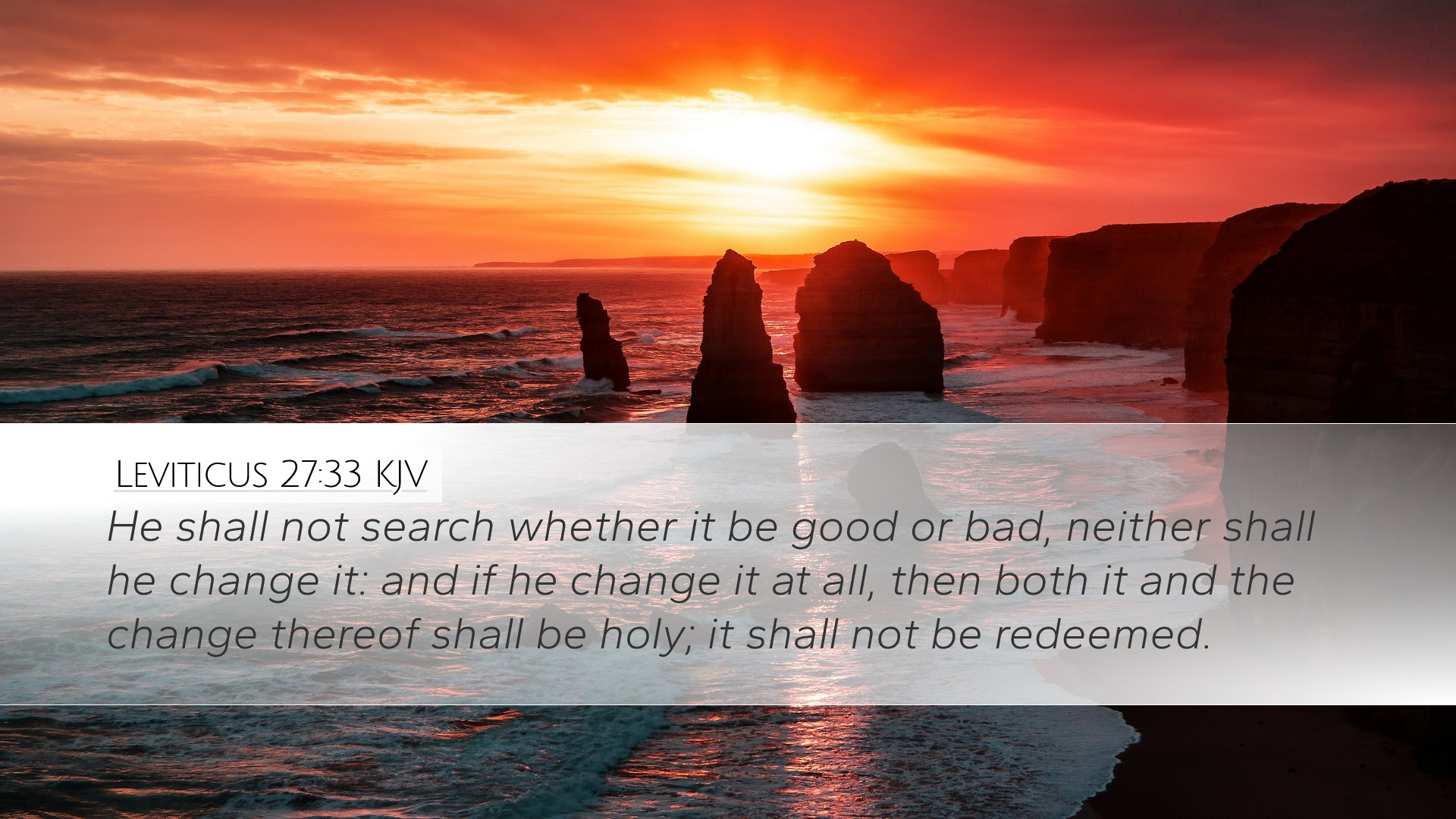Commentary on Leviticus 27:33
Text of Leviticus 27:33 (KJV): "He shall not search whether it be good or bad, neither shall he change it: and if he change it at all, then both it and the change thereof shall be holy; it shall not be redeemed."
Introduction
Leviticus 27:33 forms part of the concluding chapter of the book of Leviticus, which outlines the laws regarding vows and dedicatory offerings. This particular verse emphasizes the integrity required in dealing with sacred offerings, specifically those that involve animals intended for sacrifice or service to God. This commentary draws insights from public domain sources, focusing on the theological, practical, and moral implications of the text.
The Context of the Verse
In the preceding verses, God lays down laws regarding the valuation of persons and animals dedicated to Him. When a person dedicated an animal, God’s people were instructed on how to classify that animal as acceptable or unacceptable for sacrifice. The aim was to maintain purity in worship and ensure that offerings truly reflected devotion to God.
Divine Ownership
Matthew Henry points out that the underlying theme is the concept of divine ownership. The animals belonged to the Lord, and as such, any commitment made regarding their use or sacrifice carried significant weight. The directive not to change the dedicated animal illustrates the seriousness of God's claim on what has been set apart for Him.
Integrity of Vows
Albert Barnes elaborates on the integrity of vows. The act of dedicating an animal was a solemn pledge, and the verse reinforces that once an animal was consecrated, it should not be tampered with or exchanged. This speaks volumes about the nature of oaths—to uphold one’s promises is foundational in both civil and spiritual life.
Consequences of Change
The phrase “both it and the change thereof shall be holy” suggests a deep theological truth. As Adam Clarke mentions, attempting to replace or alter a dedicated offering inadvertently adds complexity to the commitment. Rather than nullifying the holiness, it ironically highlights the need for a sincere heart in offerings, for both the original and the substitute carry the mark of being set apart for God.
Theological Implications
This verse serves to elucidate key theological concepts that are relevant to contemporary readers, especially pastors and theologians. The principles of dedication, integrity, and the sanctity of vows can be seen across many biblical narratives and teachings.
Holiness and Consecration
The idea of holiness is central to the book of Leviticus. Matthew Henry emphasizes that what is consecrated to God must be treated with the utmost respect. The original dedication is not merely a ritualistic act; it symbolizes a deeper relationship with God. The believer is called to a life that exemplifies this holiness in personal offerings and within community worship.
Faithfulness in Ministry
For pastors and ministry leaders, the implications of this verse are profound. Albert Barnes reminds us that faithfulness to one’s commitments is essential for effective ministry. The faithful minister must recognize that their service, time, and resources have been dedicated to God, and thus must handle them with integrity.
Practical Applications
As we explore practical applications derived from Leviticus 27:33, we consider how these ancient laws inform our modern understanding of dedication and integrity.
Commitment in Our Offerings
- Every believer is called to dedicate aspects of life to God, be it time, talents, or resources.
- Commitments made within the community—such as church pledges or shared endeavors—require steadfastness.
- The practice of regularly reviewing personal dedication to God encourages ongoing spiritual growth.
Integrity in Leadership
- Leaders are to embody the principles of honesty and transparency in their dealings with congregations.
- Changes in commitments should be approached with caution and clear communication to maintain trust.
- Ministerial integrity is reflected in the faithfulness of sermons, teachings, and how one lives out their faith.
Conclusion
Leviticus 27:33 provides profound insights into the nature of divine oversight over personal commitments and offerings. It calls believers to a higher standard of living, focusing on faithfulness, integrity, and the sacredness of one's vows. As highlighted throughout the commentaries, understanding this verse encourages Christian leaders, theologians, and students alike to reflect on their commitments to God and the implications of their faith in action. The principles enshrined in this ancient text resonate as timeless truths, continually guiding the modern believer towards a life of holistic dedication to the Lord.


